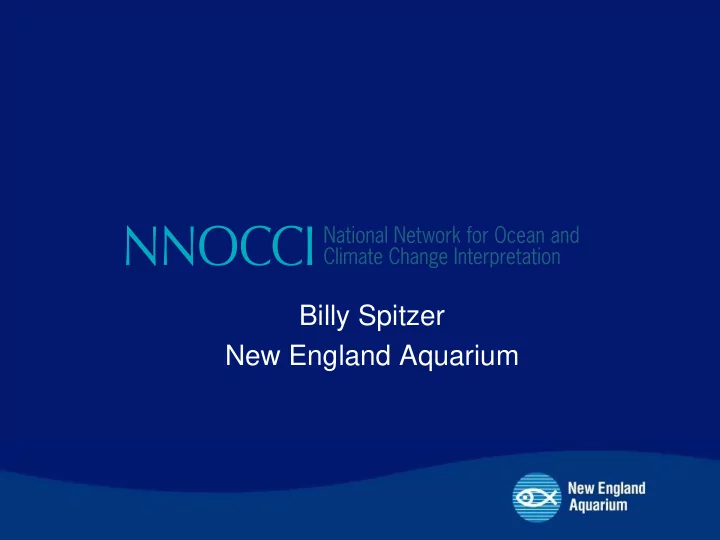

Billy Spitzer New England Aquarium
Why informal education? • “The 95% solution” • Who visits and why • What they want • Who they trust • What they get
A national network of informal science education centers and ocean scientists working together to advance public discourse about climate change
Our Vision 1. Interpreters become “vectors” for effective science communication 2. Informal science centers share a new “culture” of effective communication about complex science and policy issues 3. Ocean and climate scientists are well prepared as communicators 4. Public demand increases for science communication and civic participation
Informal Science Education Practitioners New England Aquarium Association of Zoos & Aquariums Monterey Bay Aquarium National Aquarium Cognitive & Social Scientists Ocean and Climate Frameworks Institute Scientists New Knowledge Organization Woods Hole Oceanographic Institution Penn State University Ohio Center of Science and Industry
Interpretation Interpretive Cognitive framework and social Climate science change science Audience research
Interpretive approach • “Translation” not just “information” Make science meaningful, salient, actionable • Connect to commonly held values and concepts Innovation, responsible management, interdependence • Illustrate the big picture Relate ocean animals and processes to ocean health • Link causes and effects Simple and clear explanatory language, models and metaphors Point to solutions • Informed choices we can make as individuals, communities, and as a society
Results from Phase I • Study circles initiated a community of practice needing further support • In-depth, shared training fosters confidence, self-efficacy, and a sense of hope in interpreters’ ability to communicate effectively • Hope has a strong "ripple effect" via professional and social networks • Preliminary data suggests trained interpreters convey optimism to visitors more effectively • Additional cultural research is needed to better understand how Americans think about climate change and ocean acidification
Interested in learning more? frameworksinstitute.org/workshops/neaq/ support.neaq.org/site/PageNavigator/ prof_devel_study_circle.html climateinterpreter.org
Thank you…
Recommend
More recommend